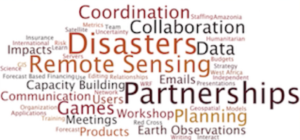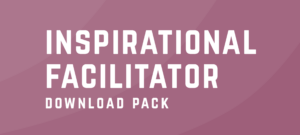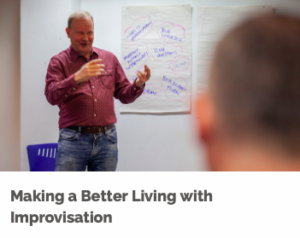Lubricate your presentations with collaborative humour

When people don’t laugh at my jokes – and by people in this context I mostly mean my children – I don’t get offended. I remind myself that I was a comedy professional. Yes, the BBC employed me for five years, and as a senior producer I made comedies and light entertainment quizzes for the radio.
One treat during this festive season was re-discovering my tape box to find copies missing from the BBC vaults for the repeats they’ll be scheduling this year on BBC Radio 4 Extra. As part of that process, they’ll be digitising the material, and I’ll be dipping into that to post you choice extracts from the early works of Steve Coogan, Caroline Aherne and others I nudged towards superstardom.
Humour encourages deeper connections
Meanwhile, humour is at the centre of an excellent presentation by my friend and colleague, Pablo Suarez, innovation director at the Red Cross Red Crescent Climate Centre.
Speaking at the recent climate talks in Poland, he’s introducing his Humour for Humanitarians project and reminds us that the roots of the word ‘humour’ are in the Greek word for ‘fluid’. Conversations, meetings and conferences all suffer when they lack the lubrication of fluidity. Instead of flowing, they become rigid, lifeless and ineffective.
At a previous climate conference Pablo asked a couple of IT assistants why they were laughing. It turned out that they’d noticed a sudden spike in internet use from the main room, and had commented that a Powerpoint must have just started. That signalled the moment when the audience lost interest and turned to their digital devices, illustrating a ludicrous (if all too common) waste of time and money. The live interaction between speaker and audience was lost.
So one of his aims is to use humour to create deeper connections at important but potentially dull conferences. And the route to this is not teaching presenters to be stand-up comedians or even to throw away all their slides, but by encouraging presenters and participants to create humour together in collaborative – often artistic – activities.
Pablo shows how information about flood warnings can be presented in striking sculptures and in augmented reality. In a presentation at the While House, his memorable way of illustrating how science should inform decision-making was throwing a frisbee to illustrate a hurricane hitting you (or not, if you sit down), based on dice throws which offer you early warnings (if you read them right).
The route is not teaching presenters to be stand-up comedians, but by encouraging presenters and participants to create humour together in collaborative activities.
Create emotional life around your topic
A first step towards this greater interaction for many of us is often storytelling. Either the presenter tells a relevant, personal story, or they encourage the participants to share their stories. The engagement and fluidity levels rise accordingly.
The reality of climate change is brought home through stories of economic loss when Dutch canals don’t freeze solidly enough for traditional skating races between villages. Or via the sense of personal loss when the flowers of your childhood no longer bloom. Sharing stories such as these encourages your session participants to tell their own stories to each other – and suddenly the details bring the topic to emotional (as well as factual) life.
Stories can have surprisingly powerful ramifications. The Climate Centre ran a project on flood prevention in a Gambian village, using NASA satellite imagery of water gathering upstream to help manage the floodplain. They placed an article in NASA’s magazine and were invited to run a 4-day exploratory program for NASA on how better to shape their vast amount of data about extreme events into information that professionals can use to help with their forecasting of climate events. I was also thrilled to discover that during the program they played a variation of a Snap game that I’d taught to Pablo, from which they made a pair of word clouds, one before and one after, showing the words that came to mind when thinking about the RC and NASA collaboration. As you see, ‘Humor’ shows up on the top rank in the ‘after’ picture.
If you’d like a first-hand opportunity to learn activities that create connection, encourage collaboration and develop better stories – learn more about our two-day Storytelling for Leaders workshop which will take you step by step through activities that will have you telling stories as never before!
Get free tips on how to develop confidence and creativity straight into your inbox.
Company Number 09564618. VAT Number GB 213 37981.
Registered Address 10 Greville House, Lower Road, Harrow on the Hill, Middlesex, HA2 0HB.
Postal Address 34a Clarence Road, St Albans, Hertfordshire, AL1 4NG
Telephone 01727 843 820
Mobile 07973 953 586





![DJI Systems - web design | marketing | admin systems | consulting - [ anglesey / wales ] DJI Systems - web design | marketing | admin systems | consulting - [ anglesey / wales ]](https://djisystems.com/banners/DJI_WebBanner_lt.png)
